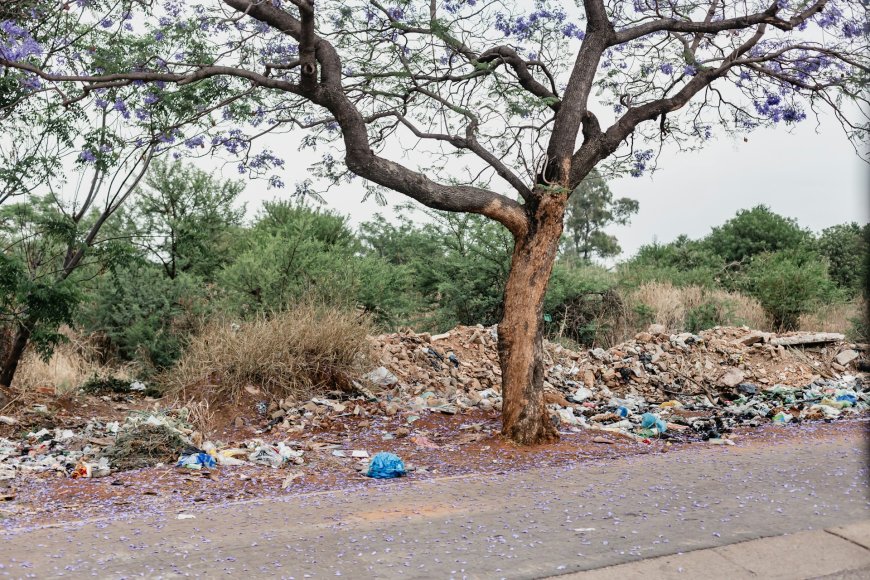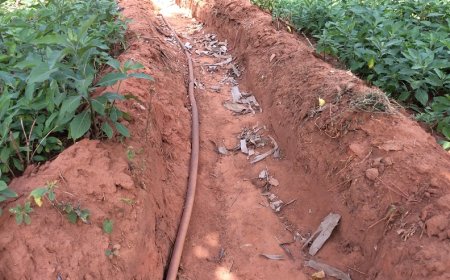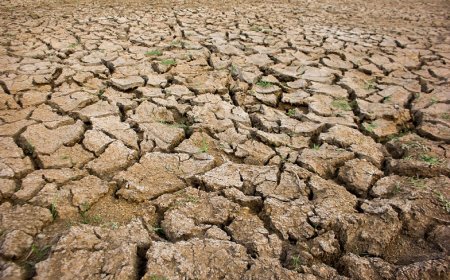Summary
- Poor waste management, including open burning and inadequate landfill practices, leads to methane and black carbon emissions, significant contributors to global warming and public health issues.
- Organic waste, when improperly managed, generates methane through anaerobic decomposition and releases harmful pollutants during open burning, posing environmental and health risks.
- Informal waste collectors play a crucial but undervalued role in waste management. Their inclusion in policies is essential for achieving sustainable solutions.
- Initiatives like the Global Methane Pledge and COP29 commitments aim to reduce methane emissions through improved landfill management, composting and waste-to-energy solutions.
- Emphasising a circular economy, composting, recycling and waste-to-energy practices can transform waste into valuable resources, reduce emissions and support economic growth in Africa.
Introduction
While waste management is a significant issue across the globe, its complexities are felt most acutely in developing regions. As waste volumes grow in these regions, driven largely by increasing populations and urbanisation, the challenge of managing waste in a sustainable and environmentally conscious manner has never been more pressing. The practice is inextricably linked to a country’s economic standing. This means that, although wealthier nations generate more waste than their less affluent counterparts, in developing regions like sub-Saharan Africa, waste management practices are often inadequate, leading to uncontrolled disposal and open waste burning, which contribute significantly to greenhouse gas (GHG) emissions. 1 2
Among the worst of GHGs produced by poor waste management practices is methane, which has a warming potential 25 times greater than carbon dioxide over a 100-year period.3 Methane is released when organic waste, including food scraps, agricultural residue and other biodegradable materials, is buried in landfills or left in open dumps, where it undergoes anaerobic decomposition. Even where waste is burned, organic waste still contributes to methane emissions, as smouldering fires in dumpsites often continue to release gasses, including methane, for extended periods. In countries where landfill management is poor, the quantities of methane which leak into the atmosphere are such that they can contribute significantly to the global methane budget.
In addition to methane, black carbon is another pollutant of concern in Africa’s waste management crisis. A component of particulate matter emitted during the incomplete combustion of organic material, black carbon has a shorter atmospheric lifetime than methane but contributes significantly to global warming due to its ability to absorb sunlight.4 It also poses severe health risks, particularly to women and children who are disproportionately exposed to harmful pollutants from open waste burning. Women also face greater health risks from waste burning due to their higher body fat content, which causes toxic pollutants to accumulate in their tissues.5 These toxins are passed to infants during breastfeeding, making waste burning not only a personal health issue but also a broader public health concern.6 Addressing black carbon emissions from waste burning requires robust enforcement of regulations, better waste collection systems and the promotion of cleaner alternatives for waste disposal, such as recycling and composting.
Global efforts and Africa’s role
Addressing the waste management crisis in Africa requires a comprehensive approach that integrates environmental, economic and social considerations. At the recently concluded COP29 in Baku, Azerbaijan, global leaders reaffirmed their commitment to tackling methane emissions, focusing heavily on those from the waste sector. Countries representing nearly half of global methane emissions from organic waste pledged to intensify efforts to reduce emissions.7 8 This builds on the Global Methane Pledge established at COP26, which aims for a 30% reduction in global methane emissions by 2030.9 The discussions at COP29 included strategies for improving landfill management, such as installing gas capture systems to collect and convert methane into usable energy.10 Diverting organic waste from landfills to composting facilities and anaerobic digestion plants was also identified as a priority.11 12 These methods both prevent methane emissions and produce valuable byproducts like fertilisers and biogas, supporting sustainable agricultural and energy systems. The outcomes of COP29 represent a decisive step forward in addressing methane emissions from waste, with scalable and sustainable solutions that could be implemented globally. Indeed, as waste pollution and methane emissions transcend national boundaries, the discussions emphasised the importance of shared responsibility and global cooperation.
The state of waste management in Africa
Africa, particularly the sub-Saharan region, faces unique challenges in waste management. The region’s waste generation is expected to double by 2050, worsening the already existing issues of uncontrolled waste disposal and poor recycling practices.13 Despite the urgency of the situation, many countries in Africa still lack comprehensive waste management systems that can effectively address the growing volumes of waste.14 One key issue is the widespread practice of open burning, particularly in low-income communities where formal waste collection services are inadequate or absent.15 Open burning releases methane as well as other harmful pollutants like black carbon, with significant health and environmental impacts. Although the total volume of open waste burning is higher in Asia, the African continent leads in per capita contributions to the practice.16
Another critical aspect of the waste crisis in Africa is the underappreciation of the role played by informal waste workers. In many African countries, informal waste collectors handle a substantial portion of the waste generated, yet their contributions and concerns are often overlooked in policy decisions.17 Informal waste workers face hazardous conditions, including exposure to toxic fumes from open burning and methane gas at dumpsites, without adequate protection or compensation. There is a growing recognition that inclusive waste management policies must incorporate the voices and needs of these workers if sustainable solutions are to be achieved.18
Opportunities for sustainable waste management
Africa’s waste sector is a significant source of methane emissions. However, it also presents a remarkable opportunity for sustainable solutions, though these will require a comprehensive approach that integrates environmental, economic and social considerations. For example, by managing organic waste properly, it can be diverted from landfills and repurposed for composting or biogas production, which not only reduces methane emissions but also provides alternative energy sources and enhances agricultural soils.19 In addition, recycling programmes can decrease the volume of waste sent to landfills, further lowering methane emissions, while waste-to-energy initiatives can transform organic waste into renewable energy, reducing reliance on fossil fuels and contributing to GHG mitigation. These integrated approaches emphasise the potential of the waste sector to drive environmental and energy benefits in Africa.
Three future scenarios have been modeled for global waste management up until 2050, with important implications for the African context.20 Under the current ‘business as usual’ approach—relying heavily on landfills, waste-to-energy plants and recycling—the global cost of waste management could reach an estimated USD 640.3 billion.21 A scenario where waste is brought under control through improved practices, on the other hand, would reduce the overall cost to USD 270.2 billion.22
The most promising of these scenarios involves a circular economy, where waste is minimised and resources are reused, resulting in a net gain of USD 108.5 billion globally.23 Applying the circular economy concept to Africa’s waste management challenges could unlock significant economic and environmental benefits. For these solutions to be effective, however, they must be supported by strong regulatory frameworks, investment in infrastructure and public awareness campaigns.24
Potential pathways for value added and sustainable waste management
The waste management crisis in Africa, particularly the challenge of methane emissions, requires urgent and concerted action. The solutions are within reach, but they need to be scaled up through strong leadership, policy reforms and investments in sustainable waste management infrastructure. As pollution from waste transcends borders, it is imperative for nations to commit to waste prevention and mitigation efforts.25 The African continent must harness the data available on waste management, embrace digitalisation and implement inclusive policies that ensure no one is left behind.26
Reducing methane emissions from the waste sector in Africa will require a multifaceted approach:
- Proper landfill management can significantly reduce methane emissions. Techniques such as landfill gas capture systems can be installed to collect and utilise methane for energy production, turning a harmful GHG into a useful resource.
- Diverting organic waste from landfills to composting facilities can prevent methane emissions from decomposing waste. Composting not only reduces emissions but also produces valuable fertiliser for agriculture.
- Converting waste into energy through technologies such as anaerobic digestion and incineration with energy recovery can reduce methane emissions and provide a source of renewable energy for communities.
- Governments need to strengthen regulations against open waste burning and ensure that offenders are penalised. This requires investments in waste collection services, especially in underserved areas, to provide alternatives to burning.
- Recognising the role of informal waste workers and including them in policy development can enhance waste collection and recycling efforts, while also improving working conditions and safety.
- Raising awareness about the health and environmental impacts of waste mismanagement can encourage behavioural changes at the individual level. Communities need to be educated on the importance of proper waste disposal, recycling and reducing waste generation.
Through the adoption of these measures, Africa can significantly reduce methane and black carbon emissions while unlocking the potential of waste as a valuable resource for sustainable development and economic growth.
Endnotes
[1] Hoornweg, D., & Bhada-Tata, P. (2012). What a waste: A global review of solid waste management. Urban Development Series Knowledge Papers No 15, World Bank, Washington DC. http://hdl.handle.net/10986/17388 (Accessed 20 November 2024.)
[2] Intergovernmental Panel on Climate Change. (2014). Mitigation of climate change: Working group III contribution to the fifth assessment report of the intergovernmental panel on climate change. Cambridge University Press, vol. 1454, p. 147. https://www.ipcc.ch/site/assets/uploads/2018/02/ipcc_wg3_ar5_full.pdf (Accessed 21 November 2024.)
[3] Intergovernmental Panel on Climate Change. (1990). Climate change: The IPCC scientific assessment. United Kingdom: Bracknell.
[4] Bond, T. C., & Bergstrom, R. W. (2006). Light absorption by carbonaceous particles: An investigative review. Aerosol Science and Technology, 40(1), 27–67. https://doi.org/10.1080/02786820500421521
[5] Marques, C. P., Zolnikov, T. R., Noronha, J. M. de, Angulo-Tuesta, A., Bashashi, M., & Cruvinel, V. R. N. (2020). Social vulnerabilities of female waste pickers in Brasília, Brazil. Archives of Environmental & Occupational Health, 76(3), 173–180. https://doi.org/10.1080/19338244.2020.1787315
[6] United Nations Environment Programme (2024). Global Waste Management Outlook 2024 for Youth: Beyond an age of waste – Turning rubbish into a resource. Nairobi. https://doi.org/10.59117/20.500.11822/44939
[7] International Energy Agency. (2024). High-level IEA-COP29 event on turning methane pledges into action focuses on how to achieve meaningful progress. IEA News. https://www.iea.org/news/high-level-iea-cop29-event-on-turning-methane-pledges-into-action-focuses-on-how-to-achieve-meaningful-progress (Accessed 5 December 2024.)
[8] U.S. Department of State. (2024). Highlights from the COP29 Global Methane Pledge Ministerial. Fact Sheet: Office of the Spokesperson. https://www.state.gov/highlights-from-the-cop-29-global-methane-pledge-ministerial/#:~:text=The%20measures%20include%20obligations%20to,of%20CO2%20equivalent%20in%202045 (Accessed 5 December 2024.)
[9] Ibid.
[10] Ibid.
[11] Ibid.
[12] International Energy Agency. (2024). High-level IEA-COP29 event on turning methane pledges into action focuses on how to achieve meaningful progress. IEA News. https://www.iea.org/news/high-level-iea-cop29-event-on-turning-methane-pledges-into-action-focuses-on-how-to-achieve-meaningful-progress (Accessed 5 December 2024.)
[13] Hoornweg, D., & Bhada-Tata, P. (2012). What a waste: A global review of solid waste management. Urban Development Series Knowledge Papers No 15, World Bank, Washington DC. http://hdl.handle.net/10986/17388 (Accessed 20 November 2024.)
[14] Ibid.
[15] Marshall, R. E., & Farahbakhsh, K. (2013). Systems approaches to integrated solid waste management in developing countries. Waste Management, 33(4), 988–1003. https://doi.org/10.1016/j.wasman.2012.12.023
[16] United Nations Environment Programme (2024). Global Waste Management Outlook 2024 for Youth: Beyond an age of waste – Turning rubbish into a resource. Nairobi.
[17] Samson, M. (ed.). (2009). Refusing to be cast aside: Waste pickers organising around the world. Women in Informal Employment: Globalizing and Organizing. Cambridge, MA: WIEGO.
[18] Wilson, D. C., Velis, C. A., & Rodic, L. (2013). Integrated sustainable waste management in developing countries. Proceedings of the Institution of Civil Engineers-Waste and Resource Management, 166(2), 52-68.
[19] Hoornweg, D., & Bhada-Tata, P. (2012). What a waste: A global review of solid waste management. Urban Development Series Knowledge Papers No 15, World Bank, Washington DC.
[20] United Nations Environment Programme (2024). Global Waste Management Outlook 2024 for Youth: Beyond an age of waste – Turning rubbish into a resource. Nairobi.
[21] Ibid.
[22] Ibid.
[23] Ibid.
[24] Ibid.
[25] United Nations Environment Programme. (2015). Waste crime - Waste risks gaps in meeting the global waste challenge: A rapid response assessment.
[26] United Nations Environment Programme (2024). Global Waste Management Outlook 2024 for Youth: Beyond an age of waste – Turning rubbish into a resource. Nairobi.
About the Author
Dr. Mohammed Dahiru Aminu
Dr. Mohammed Dahiru Aminu serves as the Policy Manager for Methane Pollution Prevention in Africa at Clean Air Task Force, a globally renowned environmental organisation dedicated to mitigating the severe impacts of climate change.




